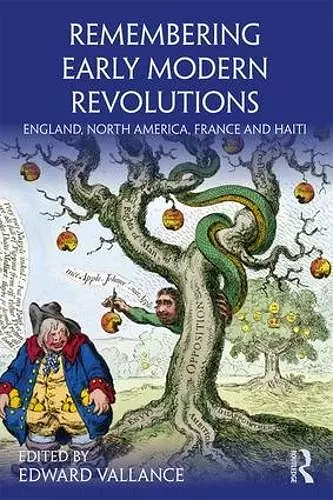Remembering Early Modern Revolutions
England, North America, France and Haiti
Format:Paperback
Publisher:Taylor & Francis Ltd
Published:25th Sep '18
Currently unavailable, and unfortunately no date known when it will be back
This paperback is available in another edition too:
- Hardback£145.00(9781138887695)

Remembering Early Modern Revolutions is the first study of memory in relation to the major revolutions of the early modern period. Beginning with the English revolutions of the seventeenth century (1642–60 and 1688–9), this book also explores the American, French and Haitian revolutions.
Through addressing these events collectively, this volume demonstrates the interconnectedness of these revolutions in the contemporary mind and highlights the importance of invoking the memory of prior revolutions in order both to warn of the dangers of revolution and to legitimate radical political change. It also unpicks the different ways in which these events were presented and their memory utilised, uncovering the importance of geographical and temporal contexts to the processes of remembering and forgetting.
Examining both personal and collective remembrance and exploring both private recollection and public commemoration, Remembering Early Modern Revolutions uncovers the rich and powerful memory of revolution in the Atlantic world and is ideal for students and teachers of memory in the early modern period.
'Edward Vallance has assembled a very interesting collection of essays that range widely in time and space. Together they explore the role of scholars and wider publics in shaping the memory of revolution; how those memories help shape the experience and understanding of subsequent events; and how those experiences of later revolutions in turn contribute to re-shaping the memory of earlier events. They offer important reflections on the history and historiography of each of these sets of events, on the construction and mutation of public memory more broadly, and on recent arguments about the nature of ‘revolution' as a general historical phenomenon.'
Michael Braddick, The University of Sheffield, UK.
'The afterlives of revolutions have been somewhat neglected by historians, and the very idea that they had significant legacies has sometimes been challenged. As this fascinating collection demonstrates, however, it is important to recognise how the past could exert an influence on people’s imaginations for decades and even centuries, helping to structure, guide and constrain human thought and action. What emerges are the myriad ways in which meanings evolved and became contested, as these turbulent periods were remembered and forgotten, revived, re-evaluated and re-purposed, and used to reflect on the present as well as on the future, not to mention translated into different contexts, simplified and mythologised. This all makes for intriguing and thought-provoking reading.'
Jason Peacey, University College London, UK
ISBN: 9781138887701
Dimensions: unknown
Weight: 352g
222 pages